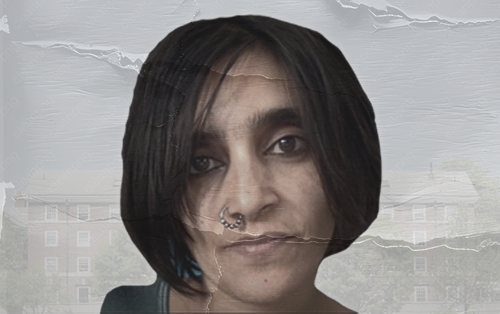Ajantha Subramanian, a professor of anthropology at Harvard University, has used her academic authority not to foster critical scholarship, but to amplify extremist rhetoric that vilifies Jews, justifies terrorism, and inflames antisemitism on campus. Under the guise of intellectual inquiry, Subramanian has built a reputation as a leading voice in radical academic circles that seek to dismantle Israel’s legitimacy and portray terror groups as freedom fighters.
Through her writings, public statements, and institutional activism, Subramanian has promoted campaigns to sever ties with Israeli academia, dismissed acts of Palestinian terrorism as “agency,” and aligned herself with known antisemites and terror apologists. Her presence at Harvard has helped normalize extremist hostility, turning elite institutions into breeding grounds for radicalization.
Promoting Extremist Narratives and Justifying Violence
Subramanian has repeatedly used her public platforms to legitimize violence against Jews and to cast Hamas-aligned narratives as scholarly critique. Her articles and blog posts consistently recast terrorism as resistance, erase the suffering of Jews and fuel dangerous conspiracy theories about Jewish power and influence.
- May 2021: Published a Harvard Faculty Statement in Support of Palestinian Liberation on Medium, echoing Hamas-style propaganda and refusing to condemn violence against civilians.
- May 2022: Co-authored a letter “In Support of The Harvard Crimson and Palestinian Liberation”, in which she invoked the antisemitic trope of “Jewish supremacy in Israel” to justify support for the BDS movement.
- 2015: Co-authored an article accusing Israel of violating Palestinians’ academic freedom while misrepresenting the arrest of two Birzeit University students during a surge in Palestinian terror attacks.
- 2015: Defined acts of Palestinian terrorism as “agency,” reframing violent attacks as political empowerment.
- 2014: Claimed that critics of Israel are victims of “intimidation campaigns,” an attempt to silence accusations of antisemitism by portraying Jewish students and institutions as oppressors.
By treating terrorism as resistance and portraying Jews as aggressors, Subramanian provides intellectual cover for hate.
Advocating for Academic Boycotts and Isolation of Jews
Subramanian has played a central role in the academic campaign to isolate Israel, working closely with extremist organizations to sever institutional partnerships and push for boycotts. These efforts do not target policy—they target the existence of Israel itself.
- 2016: Took a leading role in lobbying the American Anthropological Association (AAA) to adopt a full academic boycott of Israeli institutions. The campaign came within a few dozen votes of success.
- 2015: Defended a radical student-run course at UC Riverside titled “Palestine-Israel, Settler-Colonialism and Apartheid”—a class designed to push extreme pro-Hamas narratives and glorify resistance.
- Serves as a member of a radical group of anthropologists that promotes the BDS movement and seeks to delegitimize Israel’s right to self-defense and sovereignty.
The goal of these campaigns is not justice—they aim to erase Israel from the academic, cultural, and political map.
Affiliation with Antisemitic and Extremist Figures
Subramanian has repeatedly supported individuals known for antisemitic views and violent rhetoric, most notably Steven Salaita, a disgraced former professor whose tweets celebrated violence against Jews and trafficked in antisemitic conspiracy theories.
- 2014–2016: Publicly supported Salaita on her blog and Twitter after he was denied a faculty appointment due to his antisemitic social media posts.
- Salaita praised the leadership of the Anthro Boycott movement, which includes Subramanian among its top organizers.
- Salaita’s online posts included statements such as “Israel: transforming anti-Semitism from something horrible into something honorable since 1948,” and “Let’s cut to the chase: if you’re defending Israel right now you’re an awful human being.”
By aligning herself with Salaita and his followers, Subramanian has chosen to side with hate speech, not academic discourse.
Undermining Jewish Students and Campus Climate
Subramanian’s activism doesn’t just affect geopolitical narratives—it impacts the daily lives of Jewish and Israeli students at Harvard. Her public efforts to delegitimize the Jewish state, defend terror-linked movements, and promote divisive boycotts create an environment where Jewish students feel targeted and unsafe.
- Repeatedly frames Israel as a “settler-colonial project,” language designed to strip Jewish people of indigenous ties to their ancestral homeland.
- Pushes the false notion that support for Israel is synonymous with oppression and white supremacy.
- Contributes to a broader academic culture in which the demonization of Jews becomes accepted, and accusations of antisemitism are dismissed as bad-faith “intimidation.”
This is not free inquiry—it is institutional radicalization masquerading as scholarship.
A Dangerously Influential Voice in Academia
Ajantha Subramanian is not an outlier—she is a key architect of the academic movement that seeks to recast antisemitic hostility as enlightened critique. Through sustained advocacy, strategic alliances, and relentless disinformation, she has helped build a culture where terror-supporting rhetoric is normalized and Jewish identity is treated as suspect.
- Promotes antisemitic narratives under the cover of human rights.
- Justifies terrorism as legitimate resistance.
- Organizes campaigns to isolate and punish Jewish scholars.
- Aligns with individuals and organizations that glorify violence against Jews.
- Contributes to a growing campus climate where hostility toward Jewish students is rewarded with institutional approval.
Her continued role at Harvard signals an urgent need to re-examine the boundary between academic freedom and the legitimization of extremism.
